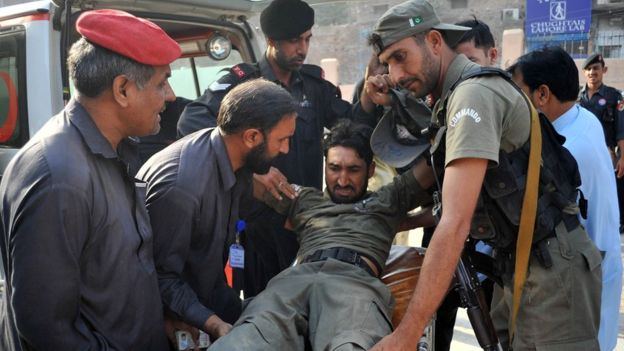TTP Attacks Peshawar Air Force Camp, Kills 16 In Mosque
TTP claims responsibility

NEW DELHI: At least 30 people, including 13 militants, have been killed in a brutal attack on a the Pakistan Air Force (PAF) camp in Peshawar; the Tehreek-i-Taliban Pakistan (TTP) claimed responsibility.
Pakistan’s Director-General (DG) Inter-Services Public Relations (ISPR) Major-General Asim Bajwa confirmed the attack and deaths via Twitter. General Bajwa confirmed that 16 people who were offering prayers at a mosque inside the camp were killed.
The ISPR Director General also confirmed that 13 militants were killed.
Army officer Captain Asfandyar was also killed in the attack.
According to the ISPR chief, the militants entered the camp at two points, then further split into sub groups.
TTP spokesperson Muhammad Khurasani claimed responsibility for the attack in a statement emailed to journalists.
Pakistani Prime Minister Nawaz Sharif condemned the attack, "Terrorists will be rooted out from the country,” Sharif vowed.
Pakistan, which has vacillated between an offensive and a dialogue with the militants, finally settled on the former after a brutal attack on an army run school in Peshawar in December 2014, that killed hundreds of people. The attack was claimed by the TTP, and decisively ended the pretence of dialogue between the government and the militant group.
Since then, the TTP has stepped up violence, and the government has intensified its military operations, Zarb-e-Azb in North Waziristan and Khyber-1 in the Khyber Agency.
In turn, the TTP has used the strikes as justification for their attacks. In fact, the attack on the school in Peshawar was justified along the same lines. The raids on North Waziristan were ordered reportedly at the insistence of the Pakistani army, with Gen. Raheel Sharif of the position that the peace talks were meaningless. The differing position of the Pakistani government, which had thus far stressed on dialogue with the militants, and the army that has called for a military response to insurgency, led to reports of a civil-military rift in Pakistan.
The talks themselves were characterised by a cycle of dialogue that seems to make no progress, militant attacks, and a military response, which brought the Taliban back on the table.
Most recently, in early May, reports that the talks were back on track seemed to be short-lived a day later as the government - responding to militant attacks in in the northwestern town of Charsadda, Badbher, Chaman and on a fruit and vegetable market in Islamabad - carried out airstrikes in the northwestern tribal belt killing at least 24 militants.
Previously, the talks were called off in February following the killing of 23 paramilitary soldiers by a faction of the Taliban in February. The government had responded with airstrikes in North Waziristan, with the possibility of a full scale military offensive being reported, prompting the Taliban to declare a ceasefire and reiterate its commitments to the dialogue process.
As the talks resumed, the Taliban demanded the release of prisoners and the creation of a demilitarised peace zone in mountainous Shaktoi, South Waziristan as a preconditioning for extending the month-long ceasefire. The government released 19 prisoners with the promise of releasing more, whilst the Taliban announced a ceasefire extension. The release of prisoners was a contentious issue, leading the government to clarify that it was done with the support of the army.
The trend is reflective of the fact that the peace talks were set to fail from the start, with the militants declaring a ceasefire when directly attacked, but failing to enforce it and readily willing to abandon it. During the month long ceasefire, that was called in response to the government launching strikes in North Waziristan after 23 paramilitary soldiers were executed, attacks continued despite the fact that negotiations were in full swing. The most violent of these attacks was the bomb attack on the district courts complex in Islamabad, which was claimed by the previously unknown Ahrarul Hind group.
After the group declared the ceasefire, attacks still continued, with 19 people killed in a powerful bomb attack in Islamabad and 17 people dying in a bomb explosion inside a carriage of a Rawalpindi bound train at Sibi station within a span of a day. Although the Taliban denounced both attacks Intelligence reports alerted police and government officials to attacks in Islamabad, Peshawar and Quetta, stating that these were being planned by factions within the TTP that were opposed to the dialogue process. Pakistani media had in fact carried stories quoting sources that claimed a new group, Ansarul Hind, would carry out attacks with the TTP’s backing.
The recent split in the Taliban complicated the process further, as an already heterogenous militant body that had difficulty imposing decisions taken by the central leadership fragmented even further.
The government had thus far, always gone back to the negotiating table. However, with the Peshawar school attack that changed, with the government and army reaching a consensus on the military offensive. The continuing attacks, such as the attack on PAF camp in Peshawar, seems to have cemented this consensus, with Pakistan -- for the first time -- having a clear strategy in dealing with militants, or at least militants that are waging a war within its own territory.



